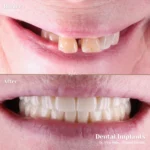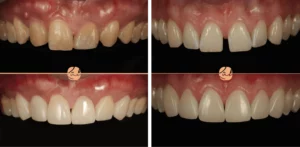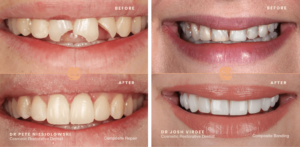How to choose the Porcelain Veneer for you
Porcelain veneers have become an incredibly popular choice for enhancing smiles due to their durability, aesthetic appeal, and the confidence they bring. However, not all porcelain veneers are created equal. Let’s dive into the various types and their unique benefits.
1. Traditional Porcelain Veneers
Traditional porcelain veneers are the most commonly known type. These veneers are thin shells of porcelain that are custom-made to fit over the front surface of your teeth.
Advantages:
- Durability: They can last 10-15 years or more with proper care.
- Natural Look: Mimic the light-reflecting properties of natural teeth, providing a realistic appearance.
- Stain Resistance: Highly resistant to staining from coffee, tea, or smoking.
Considerations:
- Preparation: Requires removal of a small amount of tooth enamel to ensure a proper fit and natural appearance.
2. Minimal-Prep Veneers
Minimal-prep veneers, also known as no-prep veneers, require less enamel removal compared to traditional veneers. Brands like Lumineers fall under this category.
Advantages:
- Less Invasive: Minimal alteration to the natural tooth structure.
- Reversible: In some cases, the process can be reversed since less enamel is removed.
Considerations:
- Thickness: They may be slightly thicker, which can affect the feel and fit compared to traditional veneers.
- Suitability: Not ideal for all patients, especially those with significant tooth imperfections or spacing issues.
3. Emax Veneers
Emax veneers are crafted from a single block of lithium disilicate ceramic, known for its superior strength and aesthetics.
Advantages:
- Strength: Highly durable and less likely to chip or crack.
- Aesthetic Quality: Offers a translucent quality that closely resembles natural teeth.
- Conservation: Requires less tooth preparation than traditional porcelain veneers.
Considerations:
- Cost: Typically more expensive due to the material and fabrication process.
4. Zirconia Veneers
Zirconia veneers are made from zirconium dioxide, a type of ceramic known for its exceptional toughness.
Advantages:
- Strength: Extremely durable and resistant to wear and tear.
- Biocompatibility: Less likely to cause adverse reactions in the body.
- Versatility: Suitable for patients with more significant dental restorations or those who grind their teeth.
Considerations:
- Aesthetics: Slightly less natural-looking compared to other porcelain options due to their opacity.
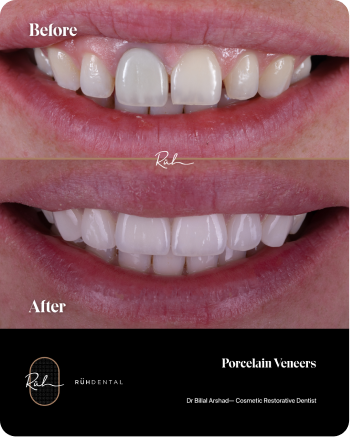
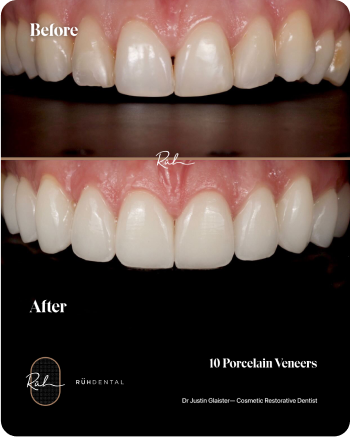
Choosing the Right Veneers
Choosing the right type of porcelain veneer depends on various factors, including your dental health, aesthetic goals, and budget. Here are some key considerations:
- Consultation: Schedule a consultation with us to discuss your specific needs and preferences. This is a crucial step to determine which type of veneer is best for you.
- Dental Health: Your current dental health plays a significant role. Patients with minimal tooth damage may benefit from minimal-prep veneers, while those with more substantial dental issues might require traditional or zirconia veneers.
- Aesthetic Goals: If achieving a highly natural look is your priority, Emax veneers might be the best choice. On the other hand, if durability is a primary concern, zirconia veneers could be more suitable.
- Budget: Veneers can vary significantly in cost. Discuss your budget with your treatment coordinator to find an option that meets your financial needs.
At Ruh Dental, we pride ourselves on offering personalized care and the highest quality dental solutions. If you’re considering porcelain veneers, our team is here to guide you through the process, ensuring you achieve the beautiful, confident smile you deserve.
Feel free to reach out to us for more information or to schedule a consultation. Your journey to a stunning smile starts here!









